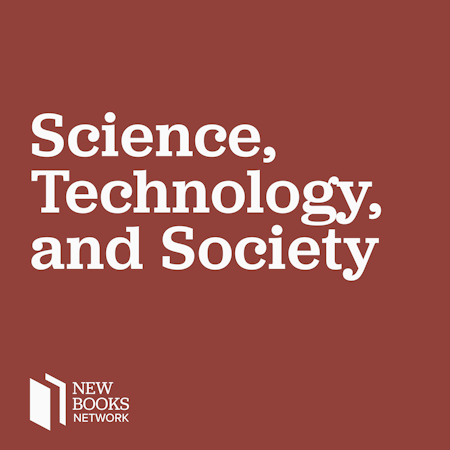
New Books in Science, Technology, and...
Interviews with Scholars of Science, Technology, and Society about their New Books
2051
Jathan Sadowski, "Too Smart" (MIT Press, 2020)
The ubiquity of technology that collects massive volumes of all kinds of data lends itself to one overarching question: “What?” As in what is the purpose(s) of this collection? What are the benefits? And, what are the impacts?
46 min
2052
Patrick M. Condon, "Five Rules for Tomorrow’s C...
How we design our cities over the next four decades will be critical for our planet...
54 min
2053
Leslie M. Harris, "Slavery and the University: ...
How involved with slavery were American universities? And what does their involvement mean for us?
56 min
2054
Wade Roush, "Extraterrestrials" (MIT Press, 2020)
Roush examines one of the great unsolved problems in science: is there life, intelligent or otherwise, on other planets?
52 min
2055
A. B. Chastain and T. W. Lorek, "Itineraries of...
The essays in this volume reshape our understanding of Latin America's Long Cold War.
45 min
2056
Lloyd B. Minor, "Discovering Precision Health" ...
Our conversation covers innovative progress underway in replacing reactive medicine with precision and prevention...
55 min
2057
Jodi Hilty, "Corridor Ecology: Linking Landscap...
Hilty and her co-authors expand on concepts and practices important to maintaining and restoring land connectivity...
52 min
2058
Wenfei Tong, "Bird Love: The Family Life of Bir...
Tong looks at the extraordinary range of mating systems in the avian world, exploring all the stages from courtship and nest-building to protecting eggs and raising chicks...
51 min
2059
Carlo Caduff, "The Pandemic Perhaps: Dramatic E...
In this episode, we discuss the pandemic when it was a ‘perhaps’, unpack the blurring of reason and faith among expert interlocutors and draw out lessons on preparedness and its paradoxes for the present global coronavirus crisis...
47 min
2060
Thor Magnusson, "Sonic Writing: Technologies of...
Magnusson provides a sweeping overview of the tools and techniques of music-making both before and after the dawn of computing...
75 min
2061
Theodora Varbouli and Olga Touloumi, "Computer ...
This book paints the landscape that brought computing into the imagination, production, and management of the built environment, whilst foregrounding the impact of architecture in shaping technological development...
56 min
2062
Brian A. Stauffer, "Victory on Earth or in Heav...
Stauffer reconstructs the history of Mexico's forgotten "Religionero" rebellion of 1873-1877, an armed Catholic challenge to the government of Sebastián Lerdo de Tejada...
58 min
2063
Amy Koerber, “From Hysteria to Hormones: A Rhet...
Koerber shows that the boundary between older, nonscientific ways of understanding women’s bodies and newer, scientific understandings is much murkier than we might expect...
61 min
2064
Owen Whooley, "On the Heels of Ignorance: Psych...
Whooley’s book is no anti-psychiatric screed; instead, he reveals a field that has muddled through periodic reinventions and conflicting agendas of curiosity, compassion, and professional striving.
59 min
2065
Arthur Asseraf, "Electric News in Colonial Alge...
Asseraf examines the workings of the “news ecosystem” in Algeria from the 1880s to the beginning of the Second World War...
59 min
2066
Paul Nahin, "Hot Molecules, Cold Electrons" (Pr...
Nahin offers a thorough study of the history and mathematics of the heat equation, which is not only important as an analysis of heat, its analysis marked the beginning of Fourier series...
49 min
2067
Matt Cook, "Sleight of Mind: 75 Ingenious Parad...
According to Cook, a paradox paradox is a sophisticated kind of magic trick...
51 min
2068
Adrian Currie, "Rock, Bone, and Ruin: An Optimi...
Currie explains that these scientists are “methodological omnivores,” with a variety of strategies and techniques at their disposal, and that this gives us every reason to be optimistic about their capacity to uncover truths about prehistory...
52 min
2069
Neil Selwyn, "What is Digital Sociology?" (Poli...
Selwyn examines the concepts, tools and practices that sociologists are developing to analyze the intersections of the social and the digital...
53 min
2070
Margaret E. Roberts, "Censored: Distraction and...
Roberts reveals the nuances of Chinese censorship in the age of the internet...
47 min
2071
Joseph Reagle, "Hacking Life: Systematized Livi...
Reagle examines these attempts to systematize living and finds that they are the latest in a long series of self-improvement methods...
73 min
2072
Maurice Finocchiaro, "On Trial for Reason: Scie...
Finocchiaro shows that there were (and are) really two Galileo “affairs.”
61 min
2073
Tweeting the Word of God: Evangelism from a "Di...
An interview with Ryan P. Burge
10 min
2074
Great Books: Julie Carlson on Mary Shelley's "F...
Mary Shelley wrote Frankenstein, or The Modern Prometheus when she was nineteen years old on a bet...
50 min
2075
Stefan Lorenz Sorgner, "Übermensch: Plädoyer Fü...
Sorgner makes the case for a Nietzschean transhumanism...
74 min